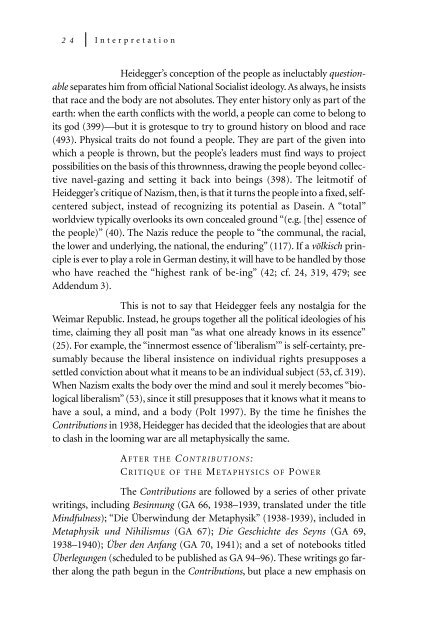Beyond Struggle and Power: Heidegger's Secret ... - Interpretation
Beyond Struggle and Power: Heidegger's Secret ... - Interpretation
Beyond Struggle and Power: Heidegger's Secret ... - Interpretation
You also want an ePaper? Increase the reach of your titles
YUMPU automatically turns print PDFs into web optimized ePapers that Google loves.
2 4 <strong>Interpretation</strong><br />
Heidegger’s conception of the people as ineluctably questionable<br />
separates him from official National Socialist ideology. As always, he insists<br />
that race <strong>and</strong> the body are not absolutes. They enter history only as part of the<br />
earth: when the earth conflicts with the world, a people can come to belong to<br />
its god (399)—but it is grotesque to try to ground history on blood <strong>and</strong> race<br />
(493). Physical traits do not found a people. They are part of the given into<br />
which a people is thrown, but the people’s leaders must find ways to project<br />
possibilities on the basis of this thrownness, drawing the people beyond collective<br />
navel-gazing <strong>and</strong> setting it back into beings (398). The leitmotif of<br />
Heidegger’s critique of Nazism, then, is that it turns the people into a fixed, selfcentered<br />
subject, instead of recognizing its potential as Dasein. A “total”<br />
worldview typically overlooks its own concealed ground “(e.g. [the] essence of<br />
the people)” (40). The Nazis reduce the people to “the communal, the racial,<br />
the lower <strong>and</strong> underlying, the national, the enduring” (117). If a völkisch principle<br />
is ever to play a role in German destiny, it will have to be h<strong>and</strong>led by those<br />
who have reached the “highest rank of be-ing” (42; cf. 24, 319, 479; see<br />
Addendum 3).<br />
This is not to say that Heidegger feels any nostalgia for the<br />
Weimar Republic. Instead, he groups together all the political ideologies of his<br />
time, claiming they all posit man “as what one already knows in its essence”<br />
(25). For example, the “innermost essence of ‘liberalism’” is self-certainty, presumably<br />
because the liberal insistence on individual rights presupposes a<br />
settled conviction about what it means to be an individual subject (53, cf. 319).<br />
When Nazism exalts the body over the mind <strong>and</strong> soul it merely becomes “biological<br />
liberalism” (53), since it still presupposes that it knows what it means to<br />
have a soul, a mind, <strong>and</strong> a body (Polt 1997). By the time he finishes the<br />
Contributions in 1938, Heidegger has decided that the ideologies that are about<br />
to clash in the looming war are all metaphysically the same.<br />
A FTER THE C ONTRIBUTIONS:<br />
C RITIQUE OF THE M ETAPHYSICS OF P OWER<br />
The Contributions are followed by a series of other private<br />
writings, including Besinnung (GA 66, 1938–1939, translated under the title<br />
Mindfulness); “Die Überwindung der Metaphysik” (1938-1939), included in<br />
Metaphysik und Nihilismus (GA 67); Die Geschichte des Seyns (GA 69,<br />
1938–1940); Über den Anfang (GA 70, 1941); <strong>and</strong> a set of notebooks titled<br />
Überlegungen (scheduled to be published as GA 94–96). These writings go farther<br />
along the path begun in the Contributions, but place a new emphasis on
















